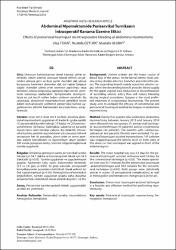Abdominal myomektomide periservikal turnikenin intraoperatif kanama üzerine etkisi
Abstract
Uterusun kanlanmasının temel kaynağı uterin arterlerdir.
Uterin arterler, uterusun lateral isthmik seviyesinden
uterusa girer ve ikiye ayrılır. Asendan dal, uterus
korpusunu beslerken desendan dal, üst vajinal bölgeye
dağılır. Asendan uterin arter akımının azaltılması veya
kesilmesi, uterus korpusuna yapılacak olan cerrahi işlemlerde
kanamayı azaltacaktır. Semptomatik leiomyomlarda
en çok tercih edilen tedavi yöntemi cerrahidir. Bu
çalışmada, abdominal myomektomide genellikle tercih
edilen konvansiyonel yöntemle periservikal turnike uygulamasının
etkinlik bakımından karşılaştırılması amaç-
lanmıştır.
Yöntem: Ocak 2013-Ocak 2014 tarihleri arasında abdominal
myomektomi uygulanan 45 kadın iki gruba ayrıldı:
(1) paraservikal turnike tekniği (15 hasta) ve (2) konvansiyonel
teknik (30 hasta). Submüköz, subseröz ve parazitik
myom tanısı olan hastalar çalışma dışı bırakıldı. Periservikal
turnike yardımlı myomektomi için uterusun isthmik
seviyesinin her iki yanından, uterin arter ve venin asendan
dalının lateralinden ve ligamentum latum içinden
16F sonda çepeçevre sarılıp, anterior bölgede bağlanarak
turnike uygulandı.
Bulgular: Ortalama operasyon süresi periservikal turnike
tekniği için 54.7 dakika ve konvansiyonel teknik için 54.6
dakikadır (p>0.05). Turnike uygulanan ve uygulanmayan
gruplar, hastanede kalış süresi bakımından benzerdir
(2.5 vs 2.6 gün, p>0.05). İki grup arasında, perioperatif
komplikasyonlar açısından istatistiksel olarak anlamlı bir
fark saptanmamıştır (p>0.05). Hemoglobin ve hematokrit
değişiklikleri, turnike uygulanan grupta daha düşüktür
ancak bu fark, istatistiksel olarak anlamlı değildir ( >0.05).
Sonuç: Periservikal turnike yardımlı teknik, uygulanabilir
ve etkili bir yöntemdir. Background: Uterine arteries are the major source of
blood flow of the uterus. At the lateral isthmic level, uterine
artery divides into two branches and enters the uterus.
The ascending branch mainly nourishes uterine corpus
while the descending branch provides blood supply
for the upper vaginal area. Reduction or discontinuation
of ascending uterine artery flow will reduce bleeding
during surgical procedures. Surgery is the most preferred
treatment in symptomatic leiomyomas. The present
study aims to compare the efficacy of conventional and
pericervical tourniquet assisted techniques in abdominal
myomectomy.
Method: Fourty-five women who underwent abdominal
myomectomy between January 2013 and January 2014
were allocated into two groups: (1) pericervical tourniquet
-assisted technique (15 patients) and (2) conventional
technique (30 patients). The patients with submucous,
subserosal and parasitic fibroids were excluded. For pericervical
tourniquet assisted myomectomy, 16F catheter
was strapped around the isthmic level on both sides of
the uterus so that tourniquet was applied in front of the
anterior region.
Results: The mean hospital stay was 2.5 days for the pericervical
tourniquet -assisted technique and 2.6 days for
the conventional technique (p>0.05). The mean operation
time was 54.7 minutes for the pericervical tourniquet
-assisted technique and 54.6 minutes for the conventional
technique (p>0.05). Both groups were statistically
similar in aspect of perioperative complications as well
as hemoglobin and hematocrit changes (p>0.05 for all).
Conclusion: Pericervical tourniquet-assisted technique
is a feasible and effective method for performing myomectomy.
Source
Afyon Kocatepe Üniversitesi, Kocatepe Tıp DergisiVolume
17Issue
3Collections
- Kocatepe Tıp Dergisi [154]



















